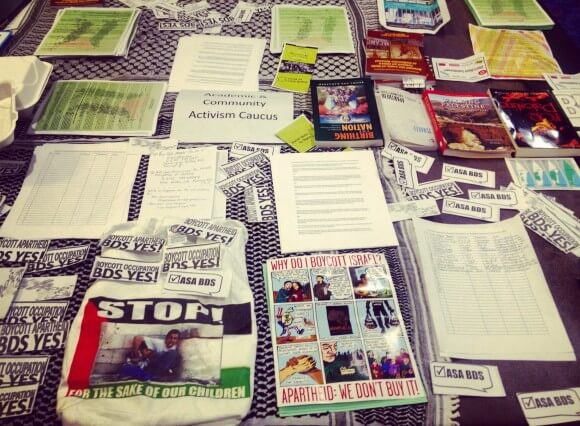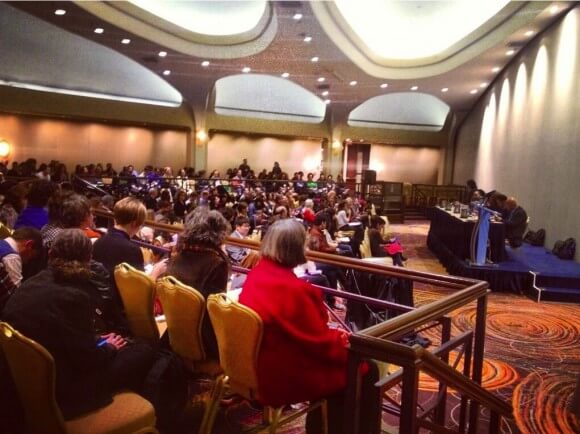The American Studies Association held their 2013 Annual Conference at the Washington Hilton in Washington, DC November 21-24. Among the many sessions were two landmark events — a “Town Hall Meeting on Palestine” and an “Open Discussion on Palestine.”These forums where to discuss and debate a boycott resolution proposed by the “ASA Activism Caucus” urging the American Studies Association to boycott Israeli academic institutions.
What happened there was historic. It was historic because every second I stood at the 2013 ASA conference I thought of every single activist I knew, every single Palestinian I knew, and I wished that they could be standing right next to me witnessing it. I wanted those people next to me because I knew what I was feeling was an empowerment that we very rarely feel in this particular setting. A setting I now realize is crucial for activism work and Palestinian solidarity alike. It was historic because now as I sit to try and write what happend at ASA, I struggle, as words just can’t do it justice.
It’s always a controversial thing to talk about being Palestinian, even more controversial to talk about Palestinian solidarity activism, in most American settings, especially an academic one. This has always seemed strange to me because academia is a place for trusted study, for trusted truths, not a place where social issues can somehow find a way to escape criticism and unrestricted discussion, the way Israel has overwhelmingly been able to do in American academia which has directly distorted the Palestinian narrative and its related activism in the US. The 2013 American Studies Association not only challenged this notion, but completely crushed it, as it gave an undergraduate student like myself enough inspiration to last me until well after graduation.

The ASA Activism Caucus set up their table right next to registration at the ASA conference. Members of the Activism Caucus and various SJP students from the DC-Maryland-Virginia area took turns sitting at the table. I spent most of the conference at the table because it was quickly becoming the coolest place to be at the conference (in between workshop and panels). The table had literature on Palestine and BDS as well as various articles of support for the ASA academic boycott. Hundreds of copies of the boycott resolution (written by the ASA Activism Caucus) were available on the table as well as hundreds of sheets with frequently asked questions about the resolution and the BDS Movement.
By the second day of the conference I had noticed that those opposing the ASA boycott of Israeli academic institutes had set up an incredibly inaccurate counter petition on the “Message Board” directly across from our table. There was a small list of it’s supporters and then space for ASA members to sign on. They managed to gain about 3 signatures on the board.
Meanwhile at the seriously busy Activism Caucus table, our petition sheets were filling quickly. 500 signatures were added to the boycott petition at the ASA conference.The petition in support of an ASA academic boycott of Israel reached over 850 signatures. Each day of tabling dozens of members of the ASA stopped by the table to either ask how they can sign the petition or for more resources on BDS. I, as a student, was completely in shock. I met some of the most incredible professors who not only supported the Palestinian cause, but were eager in wanting to share their outspoken support. I spoke with professors and scholars from all around the country who wanted me to know they were working hard on their campuses to empower SJP students like myself and to finally break the deliberately set up barrier in discussion on Palestine/Israel in academia.
At the ASA’s Town Hall meeting for Palestine (open to the public) the ballroom at the Washington Hilton was completely filled up. We heard from 6 ASA scholars who took turns discussing various issues relating to Israel/Palestine, completely uncensored. Angela Davis, one of the panelists, opened her discussion with “This is a historic moment, historic but long over due.” I looked around at the 200+ people listening to this eye opening and disturbing panel on Israel, realized I wasn’t at an SJP event, and thought “this really is historic.” This was not historic because of how many people were in attendance and their cheering whenever the boycott was brought up, but because of the very discussion being held. We were talking about things like Israel’s various apartheid systems that discriminate against its non jewish citizens, Israel’s illegal settlements/ wall/ occupation, Israel’s various war crimes in Gaza, and most emphasised- Israel’s academic institutes and their complicit role in the illegal occupation. And that is, I believe, one of the strongest goals of Palestinian activism and BDS, to simply bring this kind of discussion to the places it has always been deliberately ignored.
The following evening came the ASA Open Discussion on Palestine (only for ASA members). As we entered the ballroom, a few ASA members strongly against the boycott resolution were already there placing their counter petition on each seat. The 12 members of the ASA council were all in attendance. At the door you could grab a piece of paper, write your name on it and place it in a box, if you wished to speak. Names would be taken from the box and the ASA member called would have 2 minutes at the mic to say whatever they felt about the ASA boycott resolution. A total of 44 members were called to speak and only 7 spoke against the boycott. We heard from 37 members of the ASA who were not only supportive of the boycott, but passionate in a way I had never seen before. Professors spoke up in support of the Israeli academic boycott, linking the Palestinian struggle to various struggles of oppressed people and various social issues of war, imperialism, colonialism, occupation. It was a moment of true solidarity, speakers in support of the boycott were diverse in expertises of studies as well as diverse in their race and ethnicities. Applause in the room spoke for itself, the second an ASA member reached the mic to say ‘“I support the boycott of Israeli academic institutes” the room filled with cheers and loud applause. The 7 who spoke against the boycott received applause … but only from each other.
It was clear, it was indisputable even to those who looked like they were ready to scream with anger, almost all of the ASA members in the ballroom believed in the responsibility of their academic organization to take a stance of justice for Palestinian human rights, rights that include education and academic freedom.
After the 2013 ASA conference and working with the incredible ASA Activism Caucus, I feel more empowered than ever not only as a Palestinian American- but even more importantly as a student. The ASA Activism Caucus has reflected well on the ASA, they have bravely created a space in American academia for students like myself who strongly believe that the power of academia cannot be devoid of social activism or issues of justice.
An official decision on the Israeli academic boycott resolution has still not been released by the ASA Council who is still in session on the issue.
Link to the boycott petition (for American Studies Association members only): http://www.change.org/petitions/members-of-the-asa-support-resolution-to-boycott-israeli-academic-institutions
Link to the FAQ sheet we passed out: http://www.usacbi.org/2013/11/asa-boycott-resolution-frequently-asked-questions/



Hi Lena, did anyone record the event? Great news and I hope the ASA doesn’t give in to Zionist pressure.
Besides the issue of Apartheid, which mainly effects the native Arab population, there are other issues of concern to the population as a whole, which might warrant commercial human rights boycott, especially the issue of Israeli social -political norms on human trafficking, as the Times of Israel alerts:
TASK FORCE ON HUMAN TRAFFICKING [in Israel]
“In 2003, ATZUM joined forces with Kabiri-Nevo-Keidar (www.knklaw.com) and established the Task Force on Human Trafficking (TFHT) to help Israel put an end to human trafficking within its borders. The TFHT works tirelessly to engage and educate the public and government agencies to confront and eradicate modern slavery in Israel, and lobbies for reform in the areas of prevention, border closure, protection of escaped women, and prosecution of traffickers and pimps.”
http://atzum.org/projects/task-force-on-human-trafficking/
UJA-Federation of New York conference on human trafficking
““Trafficking,” seduction by sweet words followed by violence, “isn’t happening [only] to ‘those’ people,” to outsiders, to non-Jews, she told the overflow crowd at the daylong conference. Young Jewish women fall into that life also, she said.”
http://www.thejewishweek.com/news/new-york-news/my-experience-not-unique-says-jewish-former-prostitute
Universities can do more than pass BDS resolutions. They can hold teach-ins (as happened during the VietNam War). They can convene conferences.
Imagine that at each university in the USA there were, in 2014, a conference on Israel/Palestine, dealing with the illegalities of the occupation, with what the UNGA, UNSC, etc, can do, etc., convened by PROFESSORS or DEPARTMENTS or UNIVERSITIES or LAW SCHOOLS rather than by SJP students! That would be mainstream! That would stand the speak-no-evil AIPAC and the speak-no-evil Hillels on their heads.
That is what this ASA meeting suggests to me. Let us hope that the recommendation of this meeting is accepted and confirmed at all higher levels within ASA. The Lobby will go all out to prevent this happening. The Lobby is weaker after “Iran”. This is a good time to hand them another loss.
This is so amazing! Was so ecstatic to hear the news. A huge push toward the mainstream for Palestine solidarity activism. Lots of respect for the professors and students willing to learn difficult things and speak their conscience.
And for people like Phil and Max and countless others who’ve worked tirelessly to open this space up.
Really, support for Israel always comes down to the classic JSF debating rules.
http://jewssansfrontieres.blogspot.com/2008/07/how-to-make-case-for-israel-and-win.html